Why You Should Be Suspicious Of Cleaning Recipes That Contain Both Baking Soda And Vinegar
Here is why you should be suspicious of any homemade cleaning recipes that contain both baking soda and vinegar, together, and an exception to that general suspicion.
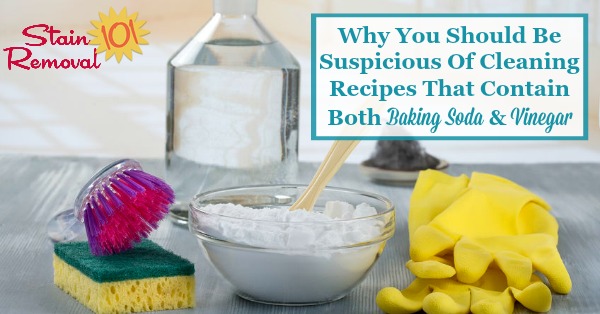
By now I think most of us have heard of two of the cleaning wonders of the world -- baking soda and vinegar.
These two substances seem to have it all. They are natural, they are frugal, and best of all, they can actually clean and remove odors from many things in your home, making them both must haves in your homemade cleaning supplies kit.
So if separately vinegar and baking soda are so darn awesome (and they are), combining them together in various homemade cleaning products recipes must make those cleaners extra-super awesome, right?
You might be surprised to learn that, no, that assumption is wrong, at least most of the time.
Combining baking soda and vinegar together, in most situations, does not make an extraordinary cleaning product at all.
In fact, when you hear about the next great cleaning recipe and then see the ingredients in it, if both baking soda and vinegar are listed within the recipe, you should be quite suspicious about whether the recipe works well, if at all.
Once you know what happens when baking soda and vinegar are combined it will be easier for you to make good choices about what will work amazingly well, versus be a disappointment, so you don't waste time and effort with recipes that are duds.
In addition, I'll discuss the main exception where combining vinegar and baking soda together does actually produce good results, and why that's the case.
What Makes Both Baking Soda And Vinegar "Magical"
Vinegar and baking soda, on their own, are both excellent cleaning products. That's why you do find them listed in many different homemade cleaning recipes, including on this site.
Baking soda, which is also known as sodium bicarbonate, has many great cleaning properties, including being a mild abrasive, neutralizing odors, and cutting grease.
In fact, you can check out a round up of baking soda uses here.
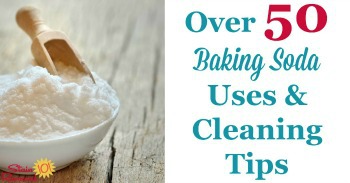
Vinegar, which is a mild acetic acid, also has many great cleaning properties, including cutting through soap scum and hard water deposits.
Here is a round up of vinegar uses on the site.
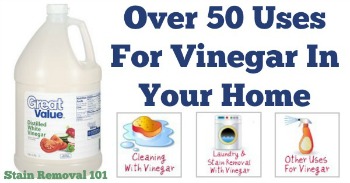
One of the main characteristics of these two ingredients, which gives them their cleaning power, is their pH. Baking soda is alkaline, while vinegar is acidic, and it is those properties, related to their pH, which cause the "cleaning magic" to happen.
(You can learn more about how the pH of your cleaner affects what it will clean here.)
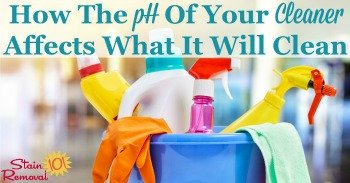
What Happens When You Combine Vinegar And Baking Soda Together
Anyone who has done the classic science project of making a homemade volcano is familiar with what happens when you combine vinegar and baking soda together. You get a lot of fizzing and it seems like big stuff is happening. After all, it causes the science project volcano to overflow, and looks pretty cool.
When working on the report for that science project you learn what it is that fizzing and bubbling represents, and that is a chemical reaction.
Specifically, combining baking soda (which is chemically known as NaHCO3) and vinegar (which is chemically known as HCH3COO) together produces carbon dioxide gas (known as CO2), water (known as H2O), plus some by products including sodium ions and acetate ions (which is a sodium acetate solution).
The fizzing you see is the carbon dioxide gas escaping from the liquid solution as part of the chemical reaction. It's fun to watch.
But here's the rub. While this chemical reaction looks pretty darn cool the chemical reaction also takes the special qualities of baking soda (its alkaline nature) and vinegar (its acidic nature) and neutralizes them, rendering them both ineffective.
At the end of the chemical reaction I described you don't have baking soda and vinegar anymore. Instead you've got carbon dioxide (which escapes into the air), and water that contains a dilute solution of sodium acetate.
And the sodium acetate solution is not, itself, a good cleaning solution. It does not have the same "magical properties" that separately baking soda and vinegar have.
That's why you should always be suspicious of a cleaning recipe that combines baking soda and vinegar together. What these recipes do is neutralize the two ingredients as it combines them, so their presence in the recipe won't help clean anything.
Sure, the recipe may in fact still clean, because of the other ingredients in it, like dish soap, or rubbing alcohol, or even water, which by itself can clean a lot, combined with elbow grease.
But typically, when you add both vinegar and baking soda together in your recipe neither of those ingredients, anymore, contributes anything to the cleaning power of the recipe and makes their addition, together, useless.
Exception When Baking Soda & Vinegar Combined Do Work Well
So after all that explanation of why you should be wary and think critically before using any homemade cleaning recipe that combines vinegar and baking soda, I've got an exception for you. That's because when it comes to the science of cleaning there's almost always an exception.
People like to combine baking soda and vinegar together when cleaning something because it looks like it's really doing something. Of course, we learned that, in fact, mostly that fizzing is all a show, and that it doesn't actually clean a thing.
But there is one big exception where the fizzing, itself, is what helps fix a household problem, and therefore, is the exception where you should combine baking soda and vinegar together.
That instance is when the fizzing is used to manually help dislodge a clogged drain in your home.
Simply sprinkle baking soda down the drain, letting it get into the nooks and crannies of the drain pipe, and surround the clog. Next, pour vinegar down the drain, and the chemical reaction that occurs as the vinegar interacts with the baking soda will release carbon dioxide gas. This bubbling reaction helps physically dislodge the clog, making it easier for you to then clear the pipe.
(You can check out more about this and other homemade drain cleaner recipes here.)
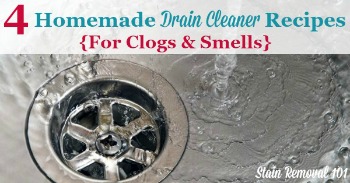
Adding The Ingredients In Different Parts Of The Sequence Of The Recipe Can Also Work
Another time you can see both ingredients in the recipe, and it still work, is when the two ingredients, in whatever order, and used not in combination, but in a sequence.
What I mean by that is that you use one, first, and then later, in a completely different step, perhaps after one of the ingredients is already rinsed away, the other is used.
A good example of this is when I suggest using both vinegar and baking soda to descale an electric kettle. The recipe uses vinegar (or another mild acid) to loosen the hard water build up within the kettle, and only after the acidic agent has time to work, and the vinegar has been rinsed away, do I suggest that any flakes of limescale left within the kettle should be scrubbed away, perhaps with the help of something slightly abrasive, such as baking soda.
In such an instance, when the ingredients are not combined together, but instead allowed to work, separately, the "magic" of them still works, and the recipe shouldn't be viewed as suspicious.
Here's a round up on the site of recipes that use both vinegar and baking soda in ways that actually work!
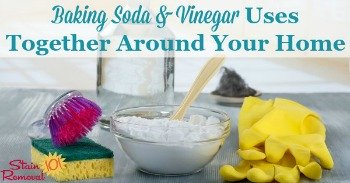
I hope this explanation has helped you think more critically about what works, and what doesn't, when using cleaning ingredients in your homemade cleaners.
Do you make your own homemade cleaning products? If so, I'd love to hear what ingredients you use, and what cleaners you make in the comments below.
In addition, are you ready to find some cleaning recipes that do really work? If so, check out these homemade cleaning products recipes here on the site.
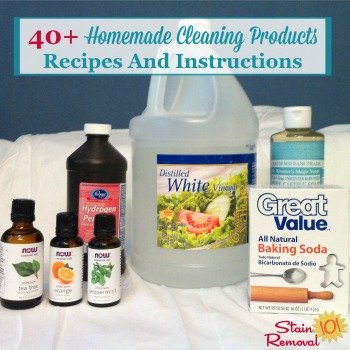
Thanks For Visiting My Website: Grab Your Free Gift!

Hi, I'm Taylor, a busy mom with 3 kids, so I have lots of hands on experience with house cleaning, laundry and my fair share of spots, spills and other messy catastrophes. Thanks for visiting my site.
I update the website all the time with tips, tutorials, cleaning recipes, reviews of products from readers like you, and tests I've done on various cleaners, removers and laundry supplies.
I'd love to give you a gift! When you subscribe to my free weekly newsletter you will receive a free printable laundry stain removal chart that you can reference as needed.
I hope you enjoy this gift, and stop by again soon!
Related Pages You May Enjoy
Lots Of Homemade Cleaners Recipes
Helpful Household Hints For All Around Your Home
CAUTION: This website is provided for informational purposes only. It is provided as is, without warranties or guarantees. Some stains and messes just won't come out, and are permanent. Further, some cleaning methods can harm your item, so if what you want to clean or launder is sentimental or expensive call a professional. See disclaimer of liability for more information.
Some Of Taylor's Favorite Recipes
Let's Stay Connected!
Get Free Email Updates
(and get a FREE printable)
Related Pages
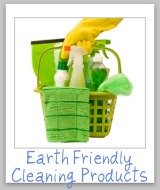 Environmentally Friendly Cleaners
Environmentally Friendly Cleaners
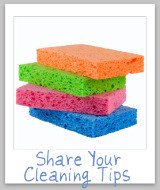 100's Of Cleaning Hints & Tricks
100's Of Cleaning Hints & Tricks
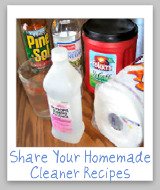 Tell Me About Your DIY Cleaners
Tell Me About Your DIY Cleaners
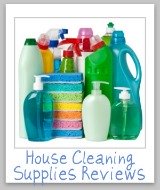 Commercial Cleaning Products Reviews
Commercial Cleaning Products Reviews
 Ask Me For House Cleaning Help
Ask Me For House Cleaning Help
 Visit Household Management 101
Visit Household Management 101
 Visit Home Storage Solutions 101
Visit Home Storage Solutions 101
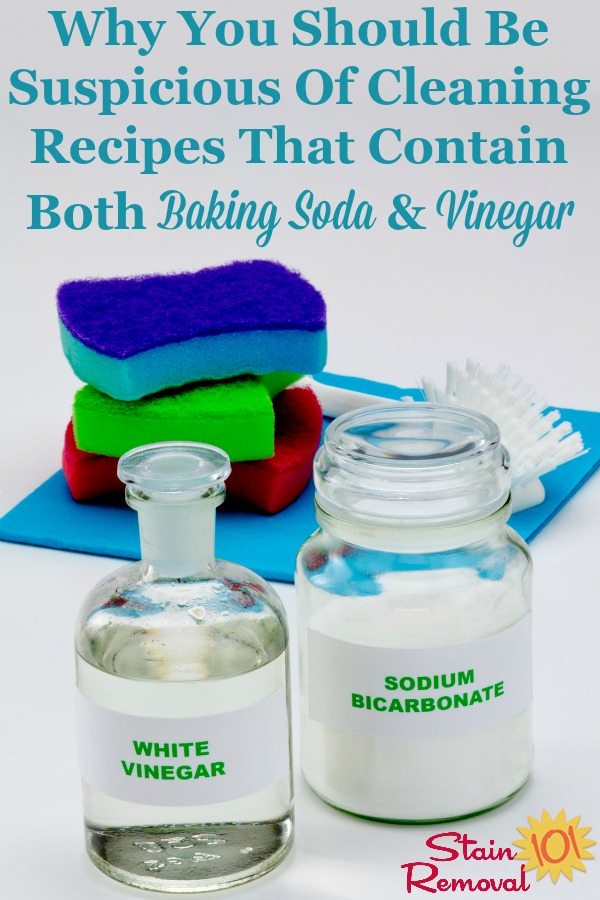
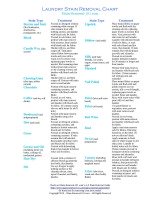
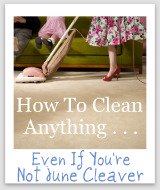
Share Your Comments, Tips & Ideas